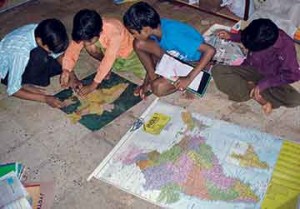Kuldeep Garg
Introduction
Map teaching and learning is usually a complex and daunting task for teachers as well as learners. The root of this complexity actually lies in the nature of the map itself. A map is nothing but an encoded representation of space. The process of encoding is an enormous effort on the part of the map maker as he has to represent space using various techniques, signs, and symbols. Similarly, decoding the map is again an equally complex and demanding activity as it requires an integrated knowledge-base and the ability to use the maps meaningfully. In this article some foundational dispositions and abilities have been dealt with, which usually remain ignored in our school geography learning.
Foundational dispositions and abilities
 The foundational dispositions and abilities are explained and described under the following heads:
The foundational dispositions and abilities are explained and described under the following heads:
Carlson says that, “The spatial relations among objects, people, and places are critical… the usefulness of spatial information depends upon a connection between an underlying internal spatial representation and the external information available in the world. For example, in reading a map, one must link the symbols and relations that are specified on the map to their corresponding entities and relations in the world.” (ibid pp. 248-49) However, this is only possible when the listed initial cognitive processes that operate upon the spatial information are given adequate opportunity to be invoked and accomplished. Conventional transactions of school geography are so abstract and isolated to children that none of the enlisted cognitive processes get initiated and consequently map learning ends up in boredom and rote learning. Therefore, it becomes very useful to analyze any geography activity based on whether enough time is given to initiate these cognitive processes.
The author holds a Ph.D. in geography and has completed his M.A. (Elementary Education) from TISS, Mumbai. He works as a Senior Associate Fellow with The Academic Resource Unit (TARU) at Digantar, Jaipur. He can be reached at kuldeep@digantar.org.
